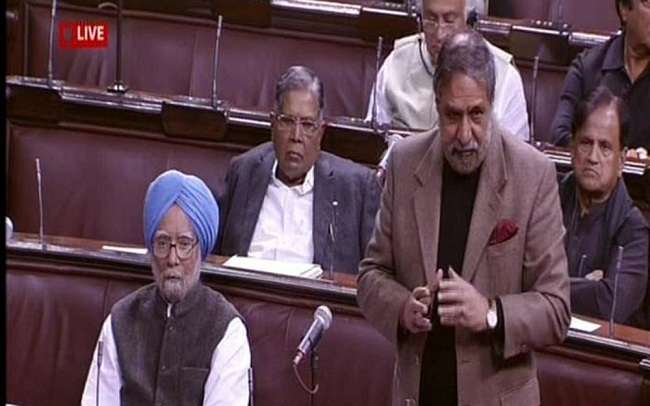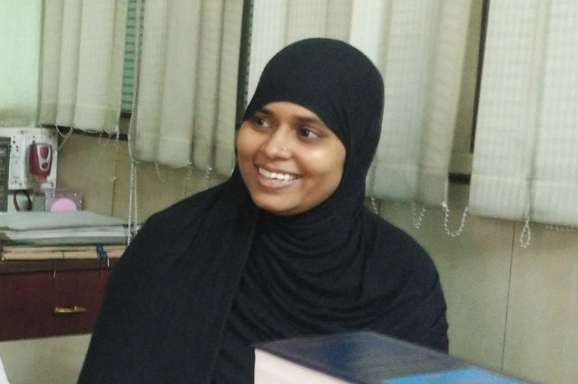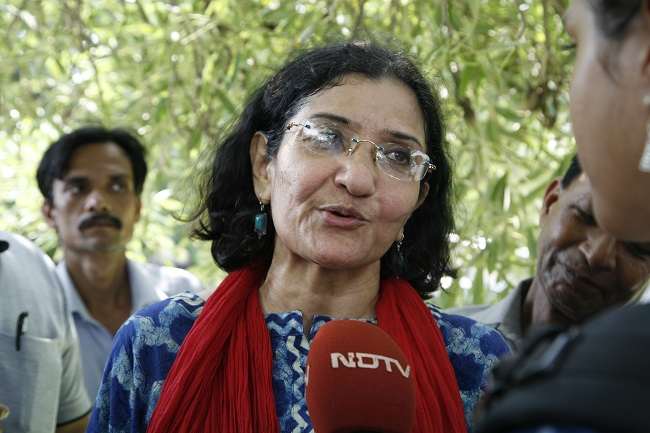
The slug-fest over Muslim Women (Protection of Rights on Marriage) Bill ended temporarily with the Rajya Sabha being adjourned but the battle-lines are firmly drawn over the fate of Muslim women facing instant divorce
~By Puneet Nicholas Yadav
On December 29, Ishrat Jahan—one of the petitioners who had successfully moved the Supreme Court to get instant triple talaq declared illegal—joined the BJP and hailed Prime Minister Narendra Modi for ensuring that the top court’s August 22 verdict was granted legislative form.
A Muslim woman’s endorsement of the leadership of Modi, the Hindu Hriday Samrat, over an issue that is extremely polarising within her community should have been seen as emphatic approval of the Muslim Women (Protection of Rights on Marriage) Bill, which was passed by the Lok Sabha a day earlier. But this has not been the case so far.
The Bill, which proposes to make talaq-e-biddat or instant triple talaq a cognisable offence punishable with a three-year jail term for any Muslim husband, has polarised the political and social discourse.
ENDS ON IMPASSE
After smooth passage in the Lok Sabha—aided purely by the brute majority that the BJP enjoys there—the Bill could not be passed by the Rajya Sabha. Un-willing to yield to a united and agitated Opposition’s demand for referring the Bill to a select committee, the Modi government preferred allowing the Bill to lapse at the end of the winter session on January 5. This was after allowing three consecutive sittings of the Upper House to be almost washed out due to the impassé over the legislation. It remains to be seen if the government decides to re-draft the Bill or tries to bulldoze it in its current form once again through both Houses.

In its December 18 edition—published before the contents of the Bill were put in the public domain—India Legal had reported how the centre had virtually draped the legislation in a shroud of secrecy. Rajnath Singh, Arun Jaitley, Sushma Swaraj, Ravi Shankar Prasad and his deputy, PP Chaudhary, who were part of the group of ministers that drafted this legislation, had made no effort to reach out to stakeholders in seeking their suggestions for the draft law (see box). It is highly probable that had the central government sought diverse opinions on provisions that could effectively end talaq-e-biddat, the strident opprobrium triggered by the Bill could have been averted.
Jaitley and Prasad have repeatedly said over the past few days that the Bill is a necessary and a natural corollary to the Supreme Court’s verdict which had directed the centre to bring in a law banning instant triple talaq within six months of the judgment. The Congress-led Opposition countered this with equal gusto, asserting that while it supports any legislation that works towards women’s empowerment and outlaws talaq-e-biddat, it is constrained to oppose the Bill in its current form because it is flawed.
SC OBSERVATIONS
A cursory glance at the verdict delivered in the Shayara Bano case shows that the claims made by Jaitley and Prasad are based on a selective reading of the judgment—more specifically, of the minority verdict delivered by then Chief Justice JS Khehar and Justice S Abdul Nazeer. This verdict says: “We… direct the Union of India to consider appropriate legislation, particularly with reference to ‘talaq-e-biddat’. Till such time as legislation in the matter is considered, we are satisfied in injuncting Muslim husbands, from pronouncing ‘talaq-e-biddat’ for a period of six months.”

However, the majority verdict—delivered by Justices Kurien Joseph, Rohinton Nariman and UU Lalit—had overruled the minority verdict and declared instant triple talaq “arbitrary, unconstitutional, illegal and even un-Islamic”. On Chief Justice Khehar and Justice Nazeer’s conclusion that talaq-e-biddat was part of religious freedom and their recommendation for legislative recourse to correct it, Justice Joseph had held “it is not for the Courts to direct for any legislation.”
Justices Nariman and Lalit had questioned the authors of the minority verdict on their recommendation for legislation, saying: “When petitions have been filed under Article 32 of the Constitution of India, is it permissible for us to state that we will not decide an alleged breach of a fundamental right, but will send the matter back to the legislature to remedy such a wrong?” The All India Muslim Personal Law Board (AIMPLB) had urged the Bench to let Parliament outlaw instant triple talaq. To this plea, Justices Nariman and Lalit had ruled that “the submission… that the ball must be bounced back to the legislature does not at all arise”. It is evident that the majority verdict of the apex court did not favour legislation against talaq-e-biddat. The practice had already been made illegal by the Court.
PRASAD’S CLAIM
Prasad has claimed repeatedly that cases of instant triple talaq have been reported despite the apex court declaring it illegal. He told the Lok Sabha that over 100 cases had come up since the Sup-reme Court verdict and hence, there was a need for deterrent legislation.
There is some merit in this argument. Former Union Minister Arif Mohammed Khan, who was also one of the lawyers demanding outlawing of talaq-e-biddat in the Supreme Court, explained to India Legal: “In the absence of a law against talaq-e-biddat, how will violators be punished… under which law will a Muslim wife seek justice?” Khan, in fact, worked behind the scenes to convince Modi regarding a strong law against talaq-e-biddat. He reportedly had a meeting with the prime minister and discussions with officials of the Union law ministry in October to convince them that the practice should be made a cognisable offence. Khan’s views, however, are not shared by others who fought for getting talaq-e-biddat declared illegal.
MANY CONTRADICTIONS
Senior lawyer Indira Jaising, who had also appeared in the Shayara Bano case, is unsparing in her criticism of the Bill. She told India Legal: “This is not what we fought for in the Supreme Court. The Court never asked for criminalisation of triple talaq, even the minority verdict only called for a law but not a criminal one. We support the declaration of instant triple talaq as void but it should be seen as a matter of domestic violence. What protection does the Muslim wife get if the husband is sent to jail for pronouncing talaq thrice? How will she sustain herself? Will imprisoning the husband not mean that triple talaq results in dissolution of marriage?”
The legislation is also fraught with contradictions. Senior lawyer and Congress Rajya Sabha MP Kapil Sibal, who represented the Muslim Personal Law Board, told India Legal: “This is a Bill that has been drafted without any application of the mind. Section 3 of the Bill seeks to declare illegal a practice that has already been declared void by the Supreme Court. Instant triple talaq would still be void if this legislation was not brought in. The sole intent of the legislation is to criminalise triple talaq, turn a civil contract of Muslim marriage into a criminal issue and target Muslim men, clearly with a political agenda.”
The contradictions within the Bill go beyond Section 3. Take Sections 5 and 6, for example. These propose a “subsistence allowance” for a Muslim woman who is a victim of talaq-e-biddat and declare that she is entitled to the custody of her minor children. They raise a peculiar contradiction. “Sections 5 and 6 of the Bill discuss post-divorce issues as if the Muslim woman’s marriage is dissolved by the mere pronouncement of talaq-e-biddat, although Section 3 says instant triple talaq is illegal. The authors of this Bill, in a matter of two brief paragraphs, have ignored that post-divorce provisions cannot be made when the divorce itself has been voided,” says A Faizur Rahman, secretary-general of the Chennai-based Islamic Forum for the Promotion of Moderate Thought.
Here’s what would happen to a Muslim man who has pronounced instant triple talaq in a fit of rage. The Bill makes him instantly liable for a three-year jail term as it doesn’t grant the wife the right to file or not file a complaint. Given that the Bill contains a statutory and mandatory declaration of criminality, it appears that the offence made out against the husband cannot be compounded or withdrawn. Thus, the State will be free to prosecute him even if the wife wants to withdraw the case and work towards reconciliation.
One doesn’t know if Jahan understood these nuances of the Bill when she praised Modi for the “revolutionary law” and joined the BJP. It is, however, clear that the legislation raises major concerns over the disastrous implications for Muslim marriages. It will be a long wait till the next session of Parliament to see whether politics triumphs over judicial reasoning, prudence and social consciousness or vice versa.
“Ishrat Jahan being used for political gains”
 ZAKIA SOMAN, co-founder of the Bharatiya Muslim Mahila Andolan, was one of the petitioners in the Supreme Court demanding a ban on instant triple talaq. But she tells PUNEET NICHOLAS YADAV that the draft Muslim Women (Protection of Rights on Marriage) Bill was formalised without consulting all stakeholders
ZAKIA SOMAN, co-founder of the Bharatiya Muslim Mahila Andolan, was one of the petitioners in the Supreme Court demanding a ban on instant triple talaq. But she tells PUNEET NICHOLAS YADAV that the draft Muslim Women (Protection of Rights on Marriage) Bill was formalised without consulting all stakeholders
What are your views on the Muslim Women (Protection of Rights on Marriage) Bill?
I welcome the government’s move to declare instant triple talaq illegal and punishable. However, there are several reservations that we at the BMMA have against the Bill and we have written to various ministries outlining our point of view. We feel that while the draft law is correct in declaring talaq-e-biddat illegal, it should not make the practice a cognisable offence. The government would have done better if it had laid out a codified procedure for divorce in the Muslim community after factoring-in Quranic provisions. Several provisions of the draft Bill like those on subsistence allowance and custody of minor children for the wife appear to be counter-productive. Also, by making talaq-e-biddat a cognisable offence, the centre has left no scope for reconciliation bet-ween the husband and wife which is the basic requirement in the Quran in deciding whether a divorce can be granted or not. In a way, while the law terms instant triple talaq illegal, its provisions ensure that divorce pronounced through this method is final and dissolves a marriage.
Could the government have avoided the protests over the draft Bill if it had held discussions with all stakeholders on the proposed provisions?
Absolutely. The government did not feel the need to go through the democratic process of inviting suggestions and recommendations from stakeholders on such crucial legislation which would decide the fate of scores of Muslim women and their families. The proper channels of drafting a law were not followed. Even the BMMA or the other petitioners who had moved the Supreme Court against instant triple talaq were not consulted.
But one of the petitioners, Ishrat Jahan, has joined the BJP and hailed Prime Minister Narendra Modi for bringing in this law.
I have great sympathy for Ishrat Jahan. I think she is being used for political gains. But then, it is the Muslim political leadership of West Bengal—be it the Trinamool Congress, the Congress or the Left—which should reflect on why Ishrat joined the BJP. Why did these secular parties and the Muslim leaders of the state not stand by her when she was abandoned after her husband divorced her by pronouncing talaq-e-biddat? She is not a very educated woman and possibly doesn’t understand the problems with the draft law, but she is obviously happy that instant triple talaq has been outlawed.
Is the Modi government really serious about outlawing instant triple talaq?
We should focus on the fact that instant triple talaq is an obnoxious practice and should be outlawed. Unfortunately, it has become a political issue and we know that the BJP will only use it for political gains like it did in Uttar Pradesh. But we can’t fault it for extracting mileage out of this. The rights of Muslim women and the plight of talaq-e-biddat victims has never been the real motivator for our political class—be it the BJP or the Congress. That makes me sad because in the end, Muslim women stand to gain very little out of a move being publicised as a panacea for our problems.

